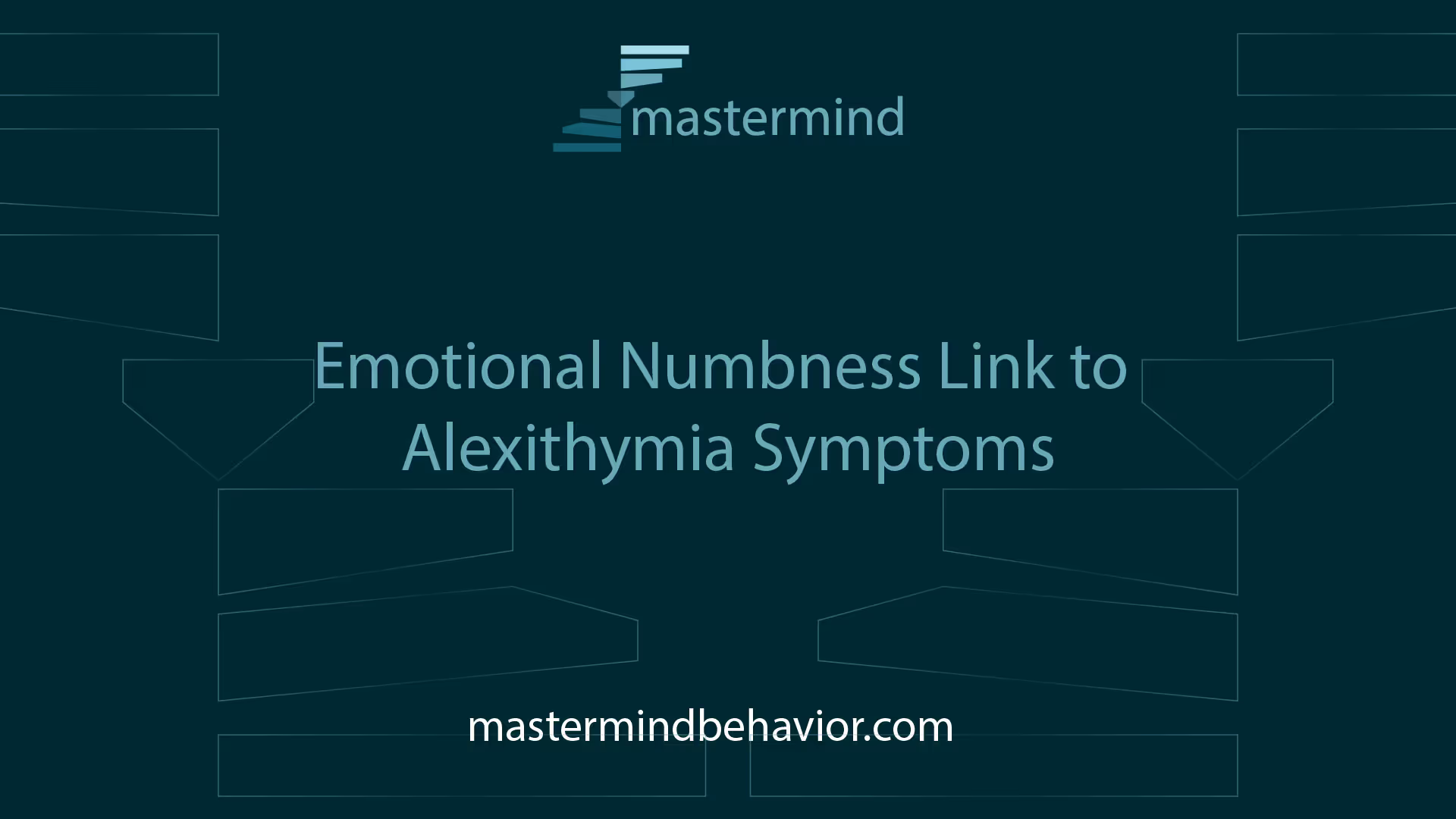Emotional Numbness Link to Alexithymia Symptoms

Understanding Emotional Numbness
Emotional numbness, also linked with the condition called alexithymia, is a complex psychological phenomenon that can be difficult to understand. It's important to delve into the definition of this term and explore its causes to provide a comprehensive understanding.

Definition and Overview
Emotional numbness is a state where individuals are not feeling or expressing emotions, a condition that may be a temporary response to stress or trauma. For some people, it becomes a strategy to protect themselves from further emotional or physical pain. However, this emotional shielding can lead to long-lasting consequences, including hindrance in forming connections with others and experiencing both positive and negative emotions over time [1].
This numbness is often described as a feeling of being emotionally "blank" or "distant," and is commonly observed during challenging times or after upsetting events. While it can act as a shield to prevent feeling overwhelmed by emotions, it can also hinder individuals from connecting with others and managing emotions in a healthy way. For a detailed explanation of alexithymia, which is closely linked with emotional numbness, you can visit our page on alexithymia definition.
Causes of Emotional Numbness
Emotional numbness can be triggered by numerous factors. It can be a result of high levels of stress, physical or emotional abuse, Post Traumatic Stress Disorder (PTSD), and overwhelming stress. It can also be a side effect of some medications used to treat depression and anxiety [1].
In some cases, emotional numbness is a coping mechanism that individuals use to protect themselves from further emotional or physical pain. This strategy, while providing temporary relief, can have long-lasting consequences, such as hindering the ability to form connections with others and experience a wide range of emotions.
Understanding the causes of emotional numbness can be especially important when dealing with conditions like alexithymia. For more information on this topic, particularly in the context of autism, you can read our article on alexithymia and autism.
Symptoms of Emotional Numbness
Recognizing emotional numbness, a common symptom of alexithymia, can be challenging due to its subtle and often internal nature. However, understanding the behavioral and emotional indicators can provide valuable insights for parents of children with autism who might be experiencing emotional numbing.
Behavioral Signs
Behavioral signs of emotional numbness primarily revolve around a marked detachment or indifference towards activities and interactions that were previously enjoyed or valued. This can manifest as:
- A lack of interest in activities that once brought joy
- Decreased participation in social activities
- Avoidance of intimate relationships and interactions
- Engaging in behaviors with potentially serious consequences for emotional and physical well-being over time
These behaviors result from an inability to experience pleasure or connect emotionally with others, often leading to a withdrawal from positive interactions, social activities, and intimacy Verywell Mind, UnityPoint Health.
Emotional Indicators
Emotionally, numbness can present as:
- A general feeling of detachment or disconnection from one's own emotions
- Apathy or indifference towards oneself or others
- An inability to feel joy or excitement
- A consistent negative response, or lack of response, to people or experiences
Emotional numbness impedes the individual's capability to feel emotions. Consequently, it can prevent them from experiencing intimacy and love, which require openness and emotional engagement D'Amore Mental Health.
Emotional numbness can also insulate personal experiences from sorrow, simultaneously curtailing the potential for joy. It's crucial to understand these signs if you're exploring the symptoms of alexithymia and the connection between alexithymia and autism.
Identifying these signs of emotional numbness in children with autism can be the first step towards seeking appropriate therapy for alexithymia, aimed at mitigating its impact and improving the child's emotional well-being.
Read more about: What are Autism Meltdowns?
Conditions Associated with Emotional Numbness
Understanding the conditions associated with emotional numbness can provide a framework for assessing and addressing this symptom. Emotional numbness, a key feature in alexithymia, can manifest as a symptom of various conditions such as anxiety disorders, depression, PTSD, and more.
Anxiety Disorders
Emotional numbness can be a symptom of anxiety disorders. High stress levels, fear, or excessive worry can prompt a response of emotional numbness, causing individuals to avoid both positive and negative emotions [1]. This emotional avoidance can exacerbate feelings of anxiety, creating a vicious cycle. For a more comprehensive understanding of how alexithymia manifests in individuals with anxiety disorders, you can refer to our article on alexithymia and autism.
Depression
Depression is another condition where emotional numbness can be a notable symptom. Individuals going through depressive episodes might be less attuned to their feelings or experience a dulling of emotions [1]. This emotional disconnection can aggravate the feelings of hopelessness and sadness that are often associated with depression. For more information on the symptoms of alexithymia, including emotional numbness, read our detailed guide on symptoms of alexithymia.
PTSD and Trauma
Emotional numbness can be a part of emotional dysregulation and is often associated with conditions like stress, PTSD, and others. It can manifest as dissociation, depersonalization, or derealization, which are all coping mechanisms to deal with overwhelming traumatic experiences [1]. Understanding this connection can help in creating a targeted approach towards addressing emotional numbness in individuals dealing with PTSD and trauma.
These conditions, often associated with emotional numbness, can be effectively managed with the help of professional intervention. If you or someone you know is dealing with emotional numbness, exploring therapy for alexithymia may provide the necessary guidance and support.
Impact of Emotional Numbness
The effects of emotional numbness, a key symptom of alexithymia, can extend far beyond the individual experiencing it. This condition can have significant implications on social relationships and overall mental health.
Social Relationships
Numbness to emotions can lead to a lack of ability to experience pleasure, positive interactions, social activities and intimacy, in addition to blocking negative feelings and experiences [1]. This can prevent individuals from developing close relationships and experiencing intimacy and love, as these require openness and the ability to feel emotions [3].
The individual may also experience a lack of joy in life, negative responses to others, and insulating personal experiences from sorrow, which in turn cuts out the potential for joy. This can serve to isolate the individual further, leading to a cycle of emotional disconnection and loneliness.
Mental Health Consequences
Emotional numbness can also have significant mental health consequences. It can be a response to trauma, fear, stress, or responsibilities, leading individuals to shut down their emotions consciously or unconsciously.
This disconnection from emotions can lead to feeling unfocused, ungrounded, or like one is going through the motions without being able to connect to their environment [4]. Over time, this can contribute to anxiety, depression, low self-esteem, and other mental health disorders.
Therefore, it is crucial to recognize the symptoms of alexithymia early and seek appropriate therapy for alexithymia. By doing so, it is possible to mitigate the negative effects of emotional numbness and improve both social relationships and mental health outcomes.
Treatment Options for Emotional Numbness
When confronting the issue of emotional numbness in individuals diagnosed with alexithymia, it's essential to consider the range of treatment options available. These therapies aim to help individuals express and approach their emotions in a safe and constructive environment.
Psychotherapy and Counseling
Psychotherapy and counseling serve as fundamental treatment approaches to address emotional numbness. These therapeutic methods provide a supportive environment where individuals can openly discuss their feelings and thoughts. The goal is to help individuals understand their emotional responses and explore healthier ways to manage their emotions.
Psychotherapy can help individuals identify the root causes of their emotional numbness and develop strategies to overcome these barriers. This method can be particularly useful for individuals dealing with emotional numbness due to trauma, fear, stress, or responsibilities, as these factors can often lead individuals to shut down their emotions either consciously or unconsciously.
For more information on how psychotherapy can help manage alexithymia, visit our article on therapy for alexithymia.
Cognitive-Behavioral Therapy
Cognitive-Behavioral Therapy (CBT) is another effective treatment option for emotional numbness. CBT focuses on helping individuals understand and change thought patterns that lead to harmful behaviors or emotional distress.
In the context of emotional numbness, CBT can help individuals identify and challenge negative thought patterns that may be contributing to their emotional disconnect. By developing healthier thinking habits, individuals can begin to experience a wider range of emotions and improve their emotional regulation.
CBT can also provide individuals with practical skills and strategies to manage their emotional numbness. These skills can include mindfulness techniques, stress management strategies, and problem-solving skills. By incorporating these techniques into their daily lives, individuals can begin to break down the barriers of emotional numbness and start to feel more connected to their emotions.
Remember, it's important to seek professional help when dealing with emotional numbness. There are numerous resources available to help individuals navigate their journey to emotional wellness. Whether it's through psychotherapy, CBT, or other therapeutic methods, there is help available for those struggling with emotional numbness.
Coping Strategies and Support
While emotional numbness can be a challenging condition to manage, there are several coping strategies and support options available that can help to alleviate symptoms and improve quality of life. These include lifestyle modifications and mindfulness practices.
Lifestyle Modifications
Changes in daily habits and environment can play a pivotal role in managing emotional numbness. Here are a few suggested lifestyle modifications:
- Regular Exercise: Engaging in physical activity can help to reduce stress and promote emotional well-being. Exercise stimulates the production of endorphins, the body's natural mood elevators.
- Balanced Diet: Consuming a diet rich in fruits, vegetables, lean proteins, and whole grains can help to boost energy levels and improve mood.
- Adequate Sleep: Establishing a regular sleep schedule can help to regulate mood and improve overall emotional health.
- Limit Alcohol and Avoid Illicit Substances: These substances can exacerbate emotional numbness and increase feelings of anxiety and depression.
Remember, it's important to consult with a healthcare provider before making any significant changes to your child's lifestyle or routine.
Mindfulness Practices
Mindfulness involves focusing on the present moment without judgment. It can help individuals with emotional numbness reconnect with their feelings and sensations. Here are a few mindfulness practices that may be beneficial:
- Meditation: Regular meditation can help to reduce stress and promote a sense of calm. It can also help individuals become more aware of their emotions.
- Deep Breathing: Deep, slow breaths can help to reduce anxiety and promote relaxation. This can be particularly helpful during moments of high stress or anxiety.
- Yoga: Yoga combines physical postures, deep breathing, and meditation. It can help to reduce stress and promote a sense of balance and well-being.
- Mindfulness-Based Stress Reduction (MBSR): This program combines meditation, body awareness, and yoga to help reduce stress and improve mindfulness.
These coping strategies and support options can help individuals manage symptoms of emotional numbness. However, they should not replace professional medical advice or treatment. If your child is experiencing symptoms of emotional numbness, it's important to seek professional help. For more information on treatment options, refer to our article on therapy for alexithymia.
References
[1]: https://www.verywellmind.com/emotional-numbing-symptoms-2797372
[2]: https://www.sandstonecare.com/blog/emotional-numbness/
[3]: https://damorementalhealth.com/overcome-emotional-numbness/
Recent articles

The impact of peer modeling on skill development
Harnessing Peer Influence to Enhance Learning and Development

How to Teach Conflict Avoidance Strategies to Children with Autism
Fostering Harmony: Strategies for Teaching Conflict Prevention to Children with Autism

How to Foster Independence in Children with Autism
Empowering Growth: Strategies for Building Autonomy in Children with Autism

How Behavioral Therapy Helps with Emotional and Behavioral Disorders
Transforming Lives Through Evidence-Based Practice

Understanding the Relationship Between Anxiety and Autism
Unraveling Anxiety’s Role in Autism Spectrum Disorder

The Importance of Collaboration Between Therapists and Parents
Enhancing Child Outcomes Through Teamwork and Trust


